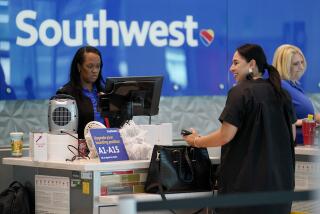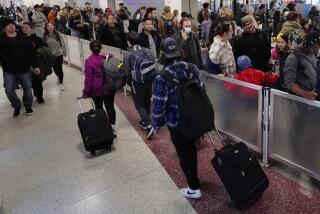Web Travel Firms Regain Speed Amid Slowdown
- Share via
Like others in the hard-hit travel and tourism industry, Internet travel companies have announced their share of job cuts, office closures and lowered forecasts in the aftermath of the terrorist attacks.
But as a whole, they are seeing their business come back quicker than expected--and experts widely predict that the online travel segment still will grow well into double-digit rates through next year.
Major online companies such as Travelocity.com Inc., Expedia Inc. and the fast-growing new kid on the block, Orbitz, are surprised that 70% to 80% of their business is back already.
And holiday traveling appears to be strong. Travelocity, the online leader with $2.5 billion in sales last year, said last week that the number of its members planning Thanksgiving trips next month is about the same as last year, and more of them will be traveling by air this year.
“We’re seeing people return to travel with a resilience that is refreshing and not completely expected,” said Christina Kozloff, marketing manager for Expedia, the No. 2 online travel site with $1.8 billion in sales last year.
The main reasons for the increase are that airline tickets are cheaper and that more people are buying them online. But Internet companies also have been winning over customers with their efforts to inform ticket holders and take telephone calls from them since Sept. 11, said Lorraine Sileo, vice president of online travel researcher PhoCusWright Inc. in Sherman, Conn.
Last May, Sileo’s firm had forecast that online travel bookings--including airlines, hotels and rental cars--would grow 58% this year and 36% in 2002.
In a revised report released Friday, PhoCusWright lowered its forecast but remained bullish, saying the Internet travel segment is still expected to grow 39% this year and 31% next year.
The research firm estimates that online travel sales would exceed $20 billion this year, accounting for 10% of the total travel market. That share is expected to grow to 15% next year, up a percentage point from its May forecast.
“The online [travel] market is an oasis in the e-economy desert,” Sileo said, noting that major online travel companies had avoided the dot-com debacle by posting operating gains and, for Expedia, two quarters of net profits.
Still, the attacks on the World Trade Center and the Pentagon have made it tougher on an industry that was already contending with a slowing economy and a sharp drop-off in corporate travel. And the subsequent retaliation by U.S. forces--and the lingering threat of further terrorist strikes in America--has left some executives unwilling even to venture a guess at what lies ahead.
“We would not even pretend to say what we see out there,” said Brian Ek, a spokesman for Priceline.com Inc., a name-your-price service that was the industry’s fifth-largest online travel company last year with $1.2 billion in sales.
“A lot of what the future is going to look like depends on how U.S. military efforts go, how long the war on terrorism lasts, whether other terrorist attacks materialize,” he said.
Smaller operations are most at risk. BizTravel.com, a company owned by Rosenbluth International Inc., closed its site Sept. 21. Financier Carl Ichan’s LowestFare.com cut 460 jobs, stopped selling domestic air fares, closed its service call center and refocused business on vacation packages, cruises and hotel bookings.
Most major operations also have fired some employees and cut other costs in response to the slowdown in travel and tourism. Travelocity, which is 70% owned by Sabre Holdings Corp., dismissed 19% of its 1,700-member staff, or about 320 employees, including all 285 at a Sacramento call center that was closed. Expedia, 70% owned by Microsoft Corp., is the only major publicly traded online travel company that hasn’t fired any employees in cost-cutting moves.
Meanwhile, the airline companies, which make up 10 of the 15 largest online travel operations in sales volume, have laid off tens of thousands of workers, cut routes by 20% and are offering steep discounts, mainly on the Internet, to get folks flying again.
Sileo said that online travel companies won’t be generating as much revenue, partly because ticket sales and commissions are down and partly because spreads will be smaller on blocks of fares they acquired at wholesale to sell at retail. Some online travel agencies buy blocks of airline seats and hotel rooms, reselling them at lower prices than offered by the carriers or hotels.
Online travel executives said they see choppy times ahead as special airline deals bump up sagging sales from time to time.
Even so, Wall Street investors are betting on them. Travel industry stocks in general plummeted in the first days of trading after the attacks, but the top three online companies, in particular, are bouncing back. Travelocity, Expedia and Priceline gained 33%, 27% and 29%, respectively, from their first-day losses. And so far this year, they remain strong with double- and triple-digit gains. Each of them also has more than $100 million cash on hand, analysts say, more than enough to sustain them through difficult times.
“Even with a severe downturn in business, they’ll probably break even or do better” on an operating basis this year, said analyst Mark J. Rowen at Prudential Securities Inc. in New York.
What the travel companies have shown is that online ticketing is convenient and information is available any time, said analyst Paul Keung at CIBC World Markets. “To look on the bright side, one way to gain control of things is to use online tools,” he said. “After all, you lose so much control as soon as you buy a ticket and leave for the airport.”
Terrell B. Jones, Travelocity’s president, said that in the days immediately after the attacks, a special team at his company gathered details of flight cancellations, airport security and other travel changes and sent a stream of e-mails to customers.
“What people discovered about us is that we have customer service,” Jones said. “I think we proved that by having these people, we can help.”
Orbitz, a privately held operation formed by five major airlines, put a small newsroom staff together to cull news reports about the attacks and the effects on travel and add them to its Web site.
“There was so much confusion and so many questions--’Can I use e-tickets?’ ‘What are security measures going to be like?’ ” said Orbitz spokeswoman Carol Jouzaitis. “The Internet was quick and broad with a response to these questions.”
It also helped that television and newspaper reports constantly urged viewers and readers to check Web sites for more information, said Jeff Katz, Orbitz’s president. The company, which opened for business in June, booked $400 million in business up to Sept. 11, which would put it in the industry’s top 10.
“We’re optimistic,” he said. “Our business model was working well before the 11th, and it’s recovering more quickly than we expected.”
More to Read
Inside the business of entertainment
The Wide Shot brings you news, analysis and insights on everything from streaming wars to production — and what it all means for the future.
You may occasionally receive promotional content from the Los Angeles Times.










